Seafood HACCP Training and Education
Training for Seafood Processors and Importers
Through its participation in the National Seafood HACCP Alliance, Florida Sea Grant provides curriculum and essential training that helps seafood processors and importers meet federal food-safety regulations.
In cooperation with the Association of Food and Drug Officials (AFDO), the Seafood HACCP Alliance has developed a uniform and cost-effective training program for importers, processors and distributors of fish and fishery products. The training assists with the implementation of Hazard Analysis Critical Control Point (HACCP) programs in commercial and regulatory settings. AFDO maintains the formal protocol for all recognized training courses, a list of approved trainers and courses, and applications for courses. The training protocol assures standard training to suit FDA expectations that are recognized and recorded with certifications issued by AFDO.
HACCP Training Courses
Basic Seafood HACCP Training Course
The Basic Seafood HACCP training course teaches the principles of HACCP and empowers processors to develop HACCP plans specific for each seafood product they handle or produce. This course can be taken by choosing one of two options —
Option 1: Basic Seafood HACCP: A 16-hour course that is setup to be taken over 2-1/2 to 3-days, taught by a Seafood HACCP Alliance instructor. This version of the Basic HACCP course provides students with in-person, hands on training.
Option 2: Basic Seafood HACCP Segments: A two-part course including an online course that is offered by Cornel University (Segment One) and in-person/virtual, live training (Segment Two) taught by a Seafood HACCP Alliance instructor.
Sanitation Control Procedures Course
The Sanitation Control Procedures (SCP) course teaches participants about proper sanitation methods, preventing cross-contamination, proper handling of toxic compounds, protecting food from adulterants and pests, how to handle employee health issues, and proper hand washing techniques. The SCP course is offered on a limited basis.
Seafood HACCP Train-the-Trainer Course
The session is organized to prepare additional, ‘qualified’ instructors to provide the standard SHA Basic Seafood HACCP Course, Segment Two HACCP Course, and the related Sanitation Control Procedures (SCP) Course in accordance with their established protocol recognized by the Association of Food and Drug Official (AFDO) and the U.S. Food and Drug Administration (FDA).
Aquaculture Course
Coming soon!
Visit AFDO’s website to learn more about each course offering.
Training Materials By Course
Manuals
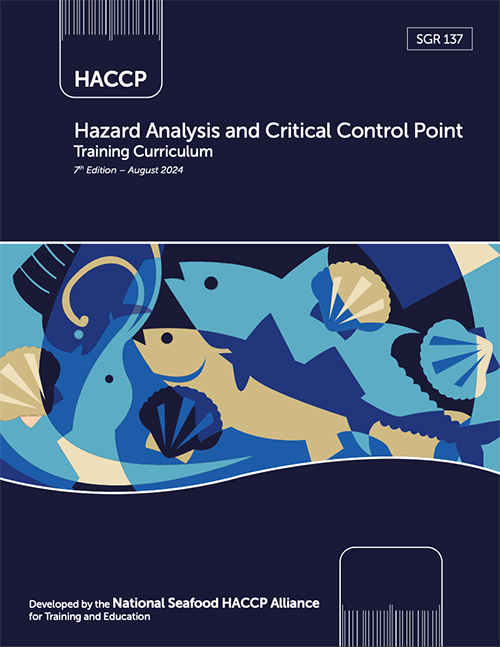
Hazard Analysis and Critical Control Point Training Curriculum (7th edition, August 2024)
SKU: SGR 137 (Blue Book)
This newly revised Seafood HACCP Training Curriculum is the most recent edition of the basic seafood HACCP training manual. The 6th edition has added forms and directions to better explain and support the development of appropriate hazard analysis and HACCP plans. All the seafood safety concerns and controls are the same, but the new approach is easier to use and understand. The book also includes changes to address requirements introduced by the Food Safety Modernization Act (FSMA).
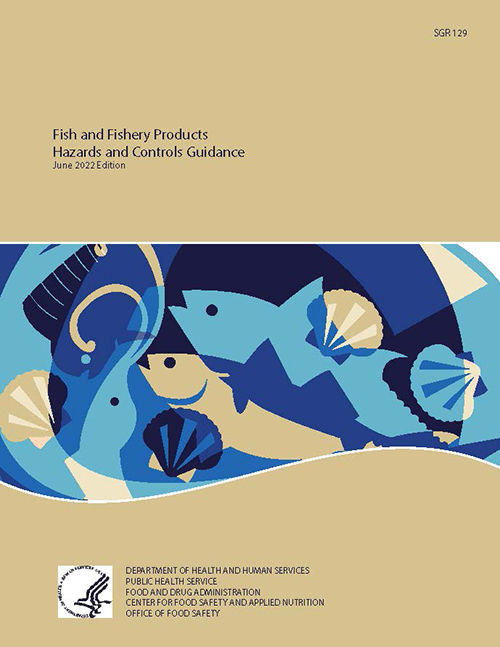
FDA Fish and Fishery Products Hazards and Controls Guidance (4th edition, June 2022)
SKU: SGR 129 (Gold Book)
The FDA Hazards Guide assists seafood industry compliance with FDA regulations that cover domestic and imported seafood. Key updates include post-harvest treatment information for pathogenic bacteria in shellfish; time and temperature adjustments to control histamine formation and pathogenic bacteria food safety hazards; consistency with changes in statutes regulations, tolerance and action levels for food additives, aquaculture drug approvals, natural toxins, chemicals, and pesticides; species hazard identification; and listing potential public health consequences of seafood safety hazards.
Worksheets
Training Models
Presentation Slides
Manuales
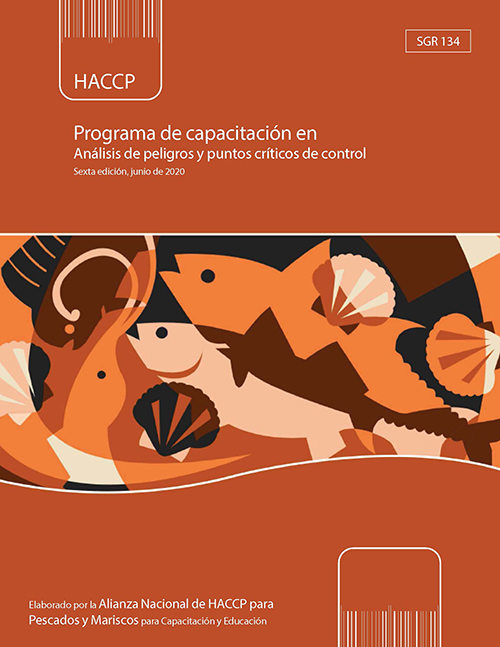
Programa de Capacitación en Análisis de Peligros y Puntos Críticos de Control: (Sexta edición, junio de 2020)
SKU: SGR 134 (Red Book)
Esta es la más reciente edición del manual de entrenamiento básico HACCP. La revisión fue ejecutada para asegurar que el manual sea consistente con los requisitos implementados por la regulación HACCP para productos pesqueros de la FDA (21 CFR 123) y por la última edición de la Guía de Peligros y Controles de la FDA.
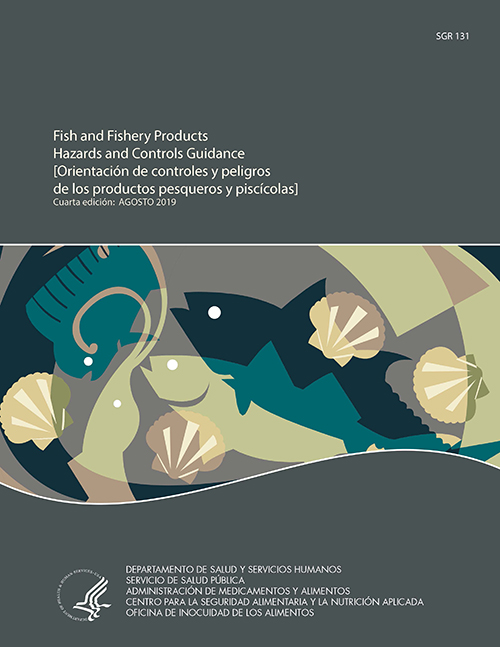
Orientación de controles y peligros de los productos pesqueros y piscícolas (Cuarta edición: Junio 2021)
SKU: SGR 131 (Gray Book)
La Guía de peligros de la FDA modificada recientemente, ayudará a que la industria de pescados y mariscos cumpla los reglamentos de la FDA sobre pescados y mariscos nacionales e importados. Entre las actualizaciones clave se encuentra la información de tratamiento posterior a la recolección de bacterias patógenas en mariscos; los ajustes del tiempo y la temperatura para controlar la formación de histamina y los peligros para la seguridad de los alimentos de bacterias patógenas; la coherencia con los cambios en los reglamentos, los niveles de tolerancia y acción de aditivos para los alimentos, la aprobación de medicamentos para acuicultura, toxinas naturales, sustancias químicas y pesticidas; la identificación del peligro de las especies y una lista de las posibles consecuencias para la salud pública de los peligros para la seguridad de pescados y mariscos.
Manuals
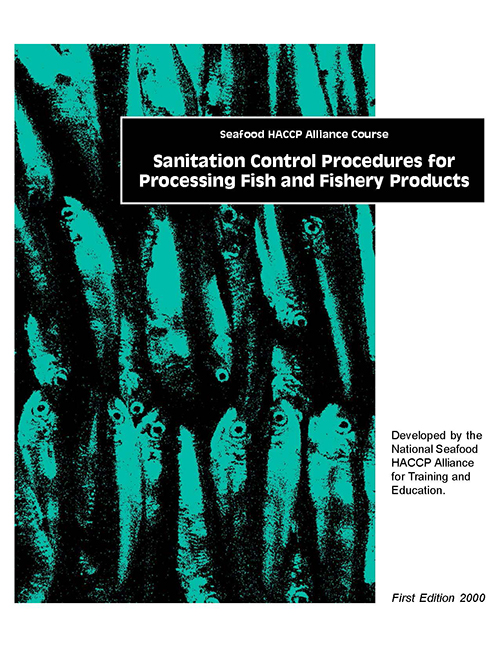
Sanitation Control Procedures for Processing Fish and Fishery Products (First Edition, 2000)
SKU: SGR 119
This volume accompanies a course intended to assist the seafood industry in developing and implementing sanitation control procedures as mandated by the Food and Drug Administration (FDA). These mandates require seafood processors to monitor sanitary control procedures used during processing in order to show their compliance with approved sanitary conditions and practices. Likewise, seafood importers must verify that the seafood imported was processed in accordance with the same FDA mandated HACCP requirements that include sanitation procedure monitoring and records.
Presentation Slides
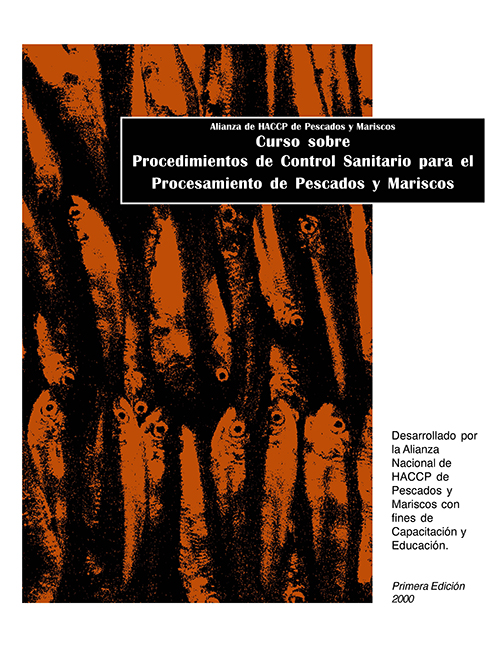
Procedimientos de Control Sanitario para el Procesamiento de Pescados y Mariscos (Primera Edición, 200)
SKU: SGR 122
Esta guía es el manual de entrenamiento para el curso dictado con el propósito de asistir a la industria pesquera en el desarrollo e implementación de Procedimientos de Control Sanitarios como requeridos por la Administración de Drogas y Alimentos de Estados Unidos de América (US FDA). Estos mandatos requieren que los procesadores de productos pesqueros monitoreen los procedimientos de control sanitarios utilizados durante el proceso para documentar el cumplimiento con las prácticas y condiciones sanitarias aprobadas. Igualmente, los importadores de productos pesqueros deben verificar que los productos importados fueron procesados bajo los mismos requisitos HACCP de la US FDA que incluyen el monitoreo y registros de los procesos sanitarios.
Training Materials
Events Calendar
Upcoming
Trainings
Register below for HACCP training courses facilitated by Florida Sea Grant’s trainer. The Seaweed Food Safety Guidance will be available soon. Please reach out to Dr. Farzad at [email protected] to pre-order the document.
Visit AFDO’s website for a full schedule of upcoming courses.
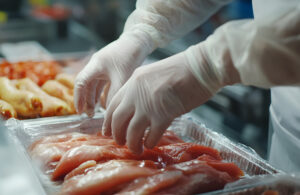 July 18, 2025
July 18, 2025
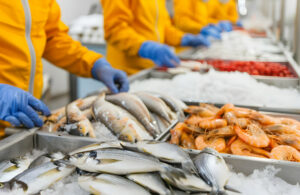 September 19, 2025
September 19, 2025
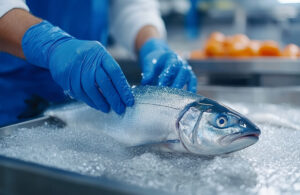 November 4, 2025
November 4, 2025